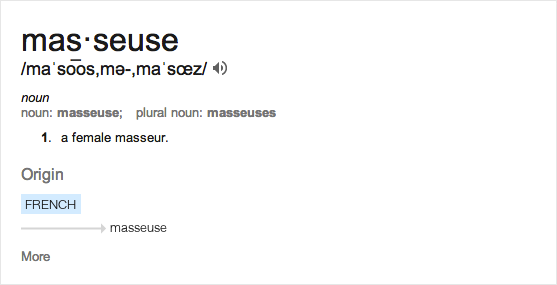Okay, interwebs. Get comfortable, because I'm about to get very, very nit picky...
Before I decided to study massage therapy, I was waist-deep in linguistics. I love language. When I encounter a new word, I dissect it. I try to figure out where it came from, where it's been, and how it ended up in the English language. I feel silly when I suddenly recognize the root of a word I've used my whole life without realizing its origin. I use hence, thus, and therefore correctly; I'm adamant about serial commas; and I cringe when someone labels a buddy picture MY FRIENDS AND I. Feel free to ask me about it; I'll leave you alone, until then.
I spent the better part of my life (all 26 years of me) as a prescriptive linguist, but Linguistics 101 quickly made me lean more strongly on the descriptive side. If you're a prescriptive linguist, you spend too much time preaching about the proper way to speak; descriptive linguists get a little more sleep. I'm strongly opposed to the internet's tendency to want to share stuff to people ("I made too much potato salad, so I'd like to share to the office"), but I have no qualms about I Can Has Cheezburger and all it has spawned.
The most curious thing that I learned about myself is that I fall into a minority that believes the language we speak affects the way we think. Without getting meta, take the terms "actor" and "actress" as an example. You have a group of actors and a group of actresses. One actor goes over to the group of actresses, and you suddenly have two groups of actors. If an actress walks over to the group of actors, you still have two groups of actors. My argument in this instance would be that we're subconsciously being told, "Dude's the default," and that women are less significant.
This is where I get a bit prescriptive and want to kill off most -ess words. Actress, waitress, stewardess, huntress, and if you use the word "directress" on any serious basis, we can't be friends.
What on Earth does any of this have to do with massage?
I was looking up examples for why I don't want to be called a masseuse, and why the term is outdated and inaccurate as far as English-speakers go. I used the phrases "massage therapist vs masseuse", "don't call me masseuse", and "I'm not a masseuse". I found what I was looking for, but these all still felt too wordy, so I plugged masseuse into the search engine on its own. Here's what Google spat back at me:

Beg pardon? What's going on here? Last I checked, Americans generally have no idea what a "masseur" is, let alone the existence of the word. Google, are you subtly trying to give English speakers a language lesson, or is this a case of "Stephanie is the feminine form of Stephen"
(my husband spells his name with a V) with no further explanation? Anyone curious enough to have come this far, to have needed to look up the definition of masseuse, would then look up this new word, masseur. Here's what Google provides:

Uh-huh.
As per the usual, the female form of [whatever] is being defined as the female version of [whatever] male form, despite the fact that the term masseuse is more widely known in American English-speaking corners than masseur (I won't endeavor to speak for other-English-speakers). If must be so lazy, would it not be more practical to fully define the term masseuse, and describe masseur as "a male masseuse"?
Published on Nov 2, 2012
The Levi the Cat Masseuse travels Southern Thailand giving stray
cats the time of their life. You can be a Cat Masseuse Master too!
Watch this short informative video featuring Salty The Reggae Cat!
You never know when TCM will show up to give you a good time!
No comments:
Post a Comment